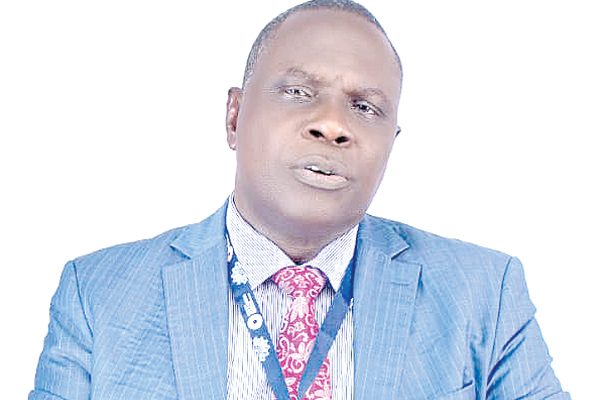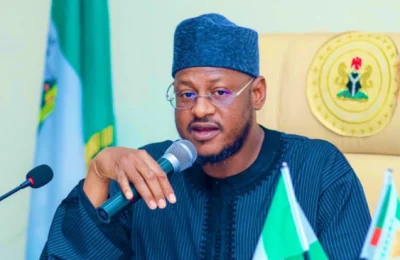In this interview with IMOLEAYO OYEDEYI, Mr Olufemi Aduwo, the Permanent Representative of Centre for Convention on Democratic Integrity (CCDI) to ECOSOC/United Nations, assesses Nigeria’s current socio-economic challenges, and how both the current and past administrations have contributed to the pains afflicting the people.
In recent times, the President Bola Tinubu administration has been blaming its predecessor for the current economic downturn of the country. In your own assessment, how badly did former President Muhammadu Buhari leave Nigeria?
We should not forget that in 2016 and 2020, Nigeria experienced economic recessions under Buhari administration. The 2016 recession was caused by decline in oil prices and of cause poor management of the currency crisis. That time, the economy contracted by 1.6 per cent with oil Gross Domestic Product (GDP) shrinking by 14.4 per cent and non-oil GDP contracting by 0.2 per cent. In 2020, the overall GDP declined 3.62 per cent in the third quarter and 6.10 per cent in the second quarter.

A few weeks ago, we were told by the Senate that the Ways and Means approved by the ninth National Assembly was illegal and plunged the country into indebtedness and economic crisis. It is so sad hearing all kinds of revelations on how the Buhari administration borrowed, and wasted the same. I hope Mr Lai Mohammed, his Minister of Information, would provide detailed information, because government should be of collective responsibility. But to be sincere with ourselves, Buhari also did not inherit a viable economy from the Goodluck Jonathan administration either, which was another wasteful government. In 1999, when former President Olusegun Obasanjo came into office, crude oil price was about $17.4 per barrel. It further surged to $27.6 in 2000, and it got to $69 in 2007 and $94 in 2008 under Yar’Adua. In 2011 under Jonathan, the average annual price of oil got to a record high of $107 per barrel, and later increased to $109 per barrel in 2012, $105.8 in 2013, but later dropped to $96.2 in 2014. In 2015, before Buhari came on board, crude oil prices hovered around $62 to $66 per barrel. Don’t forget that even if the Nigerian National Petroleum Corporation Limited (NNPCL) daily produced the total OPEC quota, what the Nigerian government gets at the end of the day is just 60 per cent of the total earnings. This is because the federal government shares the accruable oil revenue with foreign companies like Shell.
It should be stated that under the Memorandum of Understanding (MOU) between each oil company and the Nigerian federal government, the operating company in a joint venture receives a fixed sum per barrel provided the price of oil per barrel remains within certain margins. In a Joint Venture, the NNPCL and a multinational oil company (MOC) contribute to funding oil operations in proportion to their JV equity holdings. The NNPCL is mandated to lift and sell oil under these contracts for an agreed commercial fee. After deducting expenses and the cost of oil production, the NNPCL and its partners will then share the proceeds, known as profit oil/gas. I think many of us outside the NNPCL structure always get the actual amount accrued to the government at any particular time wrong.

But while illegal oil bunkering and corruption have consistently shrunk the oil earnings of each of the past administrations, will it then be correct to say that Buhari’s government is solely responsible for Nigeria’s current economic woes and why?

If you are referring to Buhari’s government alone, l would say no. When Islamic State of Iraq and Syria (ISIS) crisis started in 2013, it was clear that the United States of America would cut off funds to terror groups by crashing the price of oil. Again when President Barrack Obama granted permission for exploration of oil on land (Shale) in 2012, the warning signs were evident; but these were ignored by Nigeria’s economic managers. Nigeria earned a lot of money when oil prices were high during Jonathan but there was nothing to show for it.
Since 1999 till date, all the administrations of the Federal Government has run budget deficit. In 2008 under Yar’Adua, we almost balanced the budget but recorded a 0.2 per cent deficit. Nigeria borrowed through every oil boom, especially during the Jonathan’s administration when we saw crude oil prices at high peak. The standard excuse of building infrastructure was a fiasco. It was during the Jonathan’s time that we heard that what the constitution provided for was for all amounts of money generated to be put in the federation account and shared among the three tiers of government, and that the constitution did not say we should save anything. They argued then that what the constitution says is that we should generate and share. To them, it will be illegal for us to save, as the law does not allow it. I simply think our problem can be traced to these cumulative and reckless government policies that existed over the years. It began under the Ibrahim Babangida (IBB) Structural Adjustment Programme (SAP).
Amid the unending blame game, some observers have argued that the current government contributed directly or indirectly to the present situations, especially given how some of the Tinubu’s government major economic policies have played out for the country. How true is this?
At the Chief of Defence Intelligence annual conference in 2023, the National Security Adviser (NSA), Nuhu Ribadu, remarked that the administration of President Tinubu inherited a bankrupt country which had resulted in budgetary constraints. The lamentation was well noted. Very disturbingly again, the Minister of Finance, Wale Edun, also recently admitted in a speech at a conference of the Institute of Chartered Directors that despite the assumptions that the economic policies embarked upon by the Tinubu administration will attract the favour of Western governments and institutions, foreign investors have shown a reluctance in investing in the Nigerian economy. Invariably, what this means is that without investors coming in, the naira will continue to weaken against major currencies leading to yet more inflation and attendant consequences on the economy. These are our realities.
Amid the hardship, Mr President has visited many countries and met with potential foreign investors. In some cases, documents were even signed. But many months have passed by; we are yet to see the investors. To encourage foreign investment in Nigeria, the government should simply focus on creating an enabling environment for foreign investors by addressing security challenges and improving the regulatory framework. Above all, corruption must be reduced to a minimal level. If care is not taken, we may witness low economic growth with the unpopular market reforms leading to substantial political stability risks. More and more Nigerians may even fall into poverty as they will not be able to afford the most basic of necessities for a decent existence.
Again, since there is no sweat without sweet, the government’s economic policies must have human face. Even before revisiting the Oronsaye-led committee’s report, the president should have pruned down the government’s structure. For example, what is the importance of Ministry of Police Affairs, when we have the Police Service Commission (PSC)? If necessary, it should be merged with the Ministry of interior. Let us maintain 36 ministries as stated in the constitution, which is also huge. United States has 15 departments (ministries), and each one’s budget is bigger than Nigeria’s budget as a country. Let us block the waste, unnecessary appointments should be cancelled.
The Tinubu administration must hasten to come to terms with this existential reality before it is too late. Consultations at all level are expedient now. The era of limiting government economic solutions to Professors of Applied Economics or those who paraded certificates from Harvard, Cambridge or Oxford should be set aside. I am not condemning the holders; some are exceptionally brilliant. The like of Senator Jimoh lbrahim, not only did he attend Cambridge, Oxford and Harvard universities, he also has the practical knowledge, likewise some boardroom gurus like Samuel Adedoyin and Chief Razaq Okoya. They should be engaged for knowledge sharing. The World Bank does not limit study of global economy to university scholars alone. I belong to the Integrity Group of the World Bank, regardless l am not an economist.
What is your take on the naira devaluation and surging inflation. What more is needed to be done?
The free fall of the Naira did not start now. Its tragic history dated back to 1983 when its devaluation began and it has not ameliorated till date. From the 1960s to the 1980s, the Naira was relatively stable against the US Dollar. In recent years, the Naira has continued to face challenges related to external factors. These include fluctuations in oil prices and the global economic impact of the COVID-19 pandemic.
Anything that happens to the Naira affects everyone who transacts with it, as it is the case with the currencies of other nations. The value of Naira is not determined by some gods, prayers or incantations, nor by a group of Nigerian eggheads sitting on a round table to apportion value to it. The Naira’s volatility, weakness, stability or strength is a function of the economic choices we make and the forces of demand and supply. Unfortunately, these two factors have combined and conspired against the Naira now more than in the past.
The currency devaluation is made worse by the activities of currency speculators taking advantage of the limited quantity of USD in the system to cause havoc to an already stretched and volatile forex regime. Little wonder the forex crisis was exacerbated with the recent Naira-floating policies. The policy is a good economic one, but its fallout has negatively impacted the forex situation. The merged exchange rate regime converges all forex demand around the parallel market rate and this has remained volatile ever since the policy was introduced.
Our dependence on crude oil for decades has been our bane. Thus, fluctuations in crude oil prices in the international market have continued to keep the Naira very unstable. In relation, there is a nexus between the instability of the Naira, the massive corruption among the elites and the concomitant misplaced priorities of the governing class. The opportunity costs of stolen funds are the lost structures and systems of production that Nigeria badly needs now to be productive. We have lost decades that we should have built capacity, created the much-needed physical and knowledge infrastructure and laid the foundation for an industrialised society. We have focused on survival and curbing poverty instead of productivity, innovation and growth, which will eliminate poverty. We have been driving looking through the rearview mirror instead of looking forward to creating an industrialised society. The perception of our country at home and on the global scene is abysmal. Whilst most Nigerians in the diaspora are making great strides, news from Nigeria itself is depressing. We are battling with everything negative anyone can think of. Sadly, it seems we have accepted these things as the norm.
The current forex crisis and fall in the exchange value of the Naira resulted from a combination of all these factors. The task before the government then is to isolate and deal with these factors as clear and present economic challenges, each requiring informed tackling.
Given the fact that they both came from the same political party, do you think the Tinubu’s government can truly exonerate itself from the blames and failures of the Buhari?
In 2015, President Buhari promised to revamp the economy, curb corruption and improve security. He reiterated the promises when he sought re-election in 2019. To the best of my knowledge, Buhari’s three-point agenda was not the same as APC manifestoes, in case the party has any and it cuts across political parties, candidates at federal and state level. I can still sing the UPN anthem, recite “O ye this dawn… that brings the bright light…” and I know the UPN four-cardinal programmes off hand. But this current dispensation has brought us politicians, who are not committed to any ideals or principles. During the second Republic, president and governors of NPN or UPN pursued the parties’ agendas at all levels. It is normal that Tinubu must support his political party’s presidential candidate, regardless his state of mind. Not only him, Atiku Abubakar, Bukola Saraki and the five New Peoples Democratic Party (PDP) governors or five leprosy fingers, who defected to the All Progressives Congress (APC) in 2015 along with Obasanjo, who is like a father to me and many Christian clerics, all did the same thing Bola Tinubu did.








